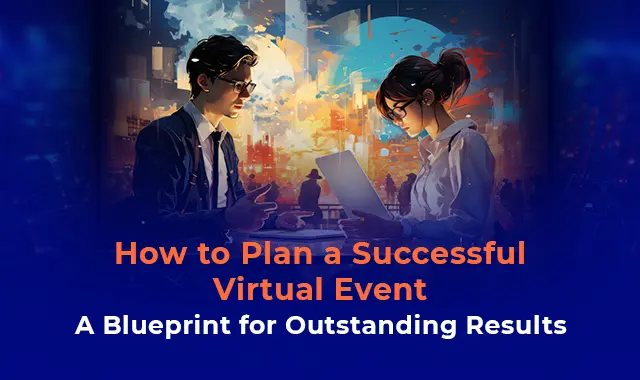
Published in:
Event Management
How to Plan a Successful Virtual Event: A Blueprint for Outstanding Results
Virtual events have been part of the event industry since the early 1990s, but their popularity and usage skyrocketed during the COVID-16 pandemic. In this guide, we’ll
Additionally, we’ll share bonus tips to enhance your virtual event planning.
Before we roll up our sleeves and plan your virtual event, let’s cover the basics—understanding the different types of virtual events is like knowing the rules before a game. Let’s find the perfect fit for your event!
Know the Types of Virtual Events
#1 Live and Simulative Events
In live events, participants engage in real-time interactions, akin to asking questions and receiving instant responses, much like chatting during a live cricket match.
Simulative events, on the other hand, merge pre-recorded content with live elements such as interactive chats and real-time feedback, offering a blend that ensures smooth execution and engagement. Both types cater to different needs and can enhance virtual gatherings effectively.
#2 Global Round-the-clock and Hybrid Event
Global “round-the-clock” events span multiple time zones with continuous programming, ensuring seamless engagement worldwide. These events allow participants from various regions to join at their convenience.
Hybrid events, like a conference with both in-person and virtual attendees, break down barriers and enhance accessibility. They combine the immersive experience of physical attendance with the convenience of virtual participation, fostering inclusivity and providing diverse networking opportunities.
#3 Webinars and Conferences
Webinars are powerful online seminars that facilitate real-time interaction between experts and participants. They are ideal for sharing cutting-edge knowledge, conducting workshops, and engaging large audiences from anywhere with an internet connection.
Conferences, on the other hand, feature multiple sessions, keynote speakers, and extensive networking opportunities. Virtual conferences replicate this dynamic experience with breakout rooms, live Q&A sessions, and interactive exhibits, enabling global engagement and collaboration.
#4 Online Trade Shows and Exhibitions
Online trade shows and exhibitions allow businesses to showcase their offerings on a global stage. With virtual booths, live product demonstrations, and interactive chats, these events provide a rich and engaging experience. Although physical trade shows have their own charm, online events ensure worldwide accessibility with just an internet connection.
For attendees, these events offer unparalleled access to industry insights, networking opportunities, and educational sessions, all from the comfort of their homes. This eco-friendly and cost-effective format is gaining popularity among businesses and professionals.
While there are countless types and options for virtual events, we’ve covered the most popular ones. Now, let’s zoom in on the highlights as we delve into the guide for planning a successful virtual event to gain more valuable insights.
How to Plan a Successful Virtual Event?
- Pre-Event Planning (Preparation Phase)
- Real-time planning (execution phase)
- Post-Event Activities (Follow-Up Phase)
Pre-Event Planning (Preparation Phase)
Be Clear on your Goals and Objectives
In every planning process, knowing your goals and objectives sets a strong foundation. So clearly outline the key performance indicators (KPIs).
Focus on your Audience’s Interests
Understand your audience deeply to tailor compelling content that meets their specific interests and needs effectively.
Choose the Right Platform
Research and select a virtual event platform that matches your event type and size, ensuring it supports necessary features like live streaming and interactive tools.
Promote your Event
Create a buzz by sharing sneak peeks, speaker announcements, and behind-the-scenes content. Use social media, email marketing, and partnerships to get the message out.
Have Strong Tech Support
Fine-tune technical aspects meticulously, conducting dry runs and preparing a responsive support team to troubleshoot any unforeseen challenges.
Real-time planning (execution phase)
Be Clear on your Objectives and Audience Interests
In every planning process, knowing your goals and objectives sets a strong foundation. So clearly outline the key performance indicators (KPIs). Understand your audience deeply to tailor compelling content that meets their specific interests and needs effectively.
Monitor and Resolve Technical Issues
Keep a close eye on the event platform to promptly address any technical glitches or connectivity issues, ensuring a seamless experience for all participants.
Respond to Audience Feedback
Be responsive to audience feedback and inquiries throughout the event, addressing questions promptly and adapting event activities based on participant input to enhance engagement.
Post-Event Activities (Follow-Up Phase)
Send Personalised Thank-you Emails
Express gratitude to attendees, speakers, and sponsors with personalised emails highlighting specific event highlights and their contributions and detailing future events.
Share Event Highlights on Social Media
Amplify the event’s impact by sharing key sessions, memorable moments, and participant interactions across social media platforms, extending the event’s reach and generating new leads.
Collect and Analyse Feedback
Gather attendee feedback through surveys or polls to evaluate attendee satisfaction and identify areas for improvement or future topics of interest.
Bonus Tip: Elevate Your Virtual Event with Professional Guidance
Planning a virtual event can be challenging. That’s where partnering with a virtual event planner can make all the difference! Our team is here to streamline the process, ensuring seamless execution and maximising attendee engagement. From handling logistics to providing technical support, we bring expertise that enhances event quality and participant satisfaction. Let us be your partner in creating a memorable virtual event experience that feels like home. Together, we’ll make your event a success!
Final thoughts
In a nutshell, we’ve explored various types of virtual events, detailed the planning process, and shared valuable bonus tips. Visit our website for more insightful blogs on everything related to event management. Learn with us and grow your skills—because at [Your Company Name], knowledge is the key to event excellence!
SHARE ON



